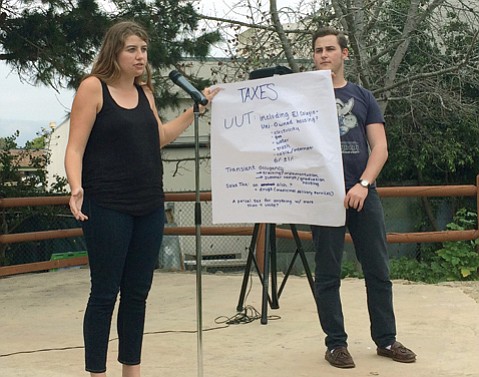The Home Stretch for AB3
Isla Vista Self-Governance Faces the Voters

Despite Isla Vista’s historically powerful collective will, proper self-governance has proved remarkably elusive: campaigns for cityhood, efforts at local community governments (sans the Rec and Park District), and an attempt to join in on the incorporation of Goleta all resulted in failure.
After decades living in its county home for half a century, this half-square mile of now 23,000 people has its best shot yet at leaving the nest and living independently: Next November, Isla Vistans will take to the polls to vote on whether or not to establish a community services district (CSD), approve a utility tax to fund it, and elect its first board members.
Das Williams, who represents California’s 37th District in the State Assembly, which includes I.V., introduced AB 3 into the Legislature in an attempt to establish self-governance via state law. Throughout 2015, I.V. residents and stakeholders met numerous times to provide input and hammer out details on a wide range of both the bill’s crucial and minute components. In September, the bill passed in the Legislature, received the governor’s autograph the following month, and received unanimous support from the county supervisors earlier this month for sending off the application to the Local Agency Formation Commission (LAFCO). After a procedural review set to begin next month by LAFCO, which can’t kill the district but will ultimately determine the CSD’s suite of powers and tax rate, the final push begins.
The CSD will be governed by a board of seven, one of whom is appointed by UCSB’s chancellor, another by the county supervisors, and the rest elected by Isla Vistans. The CSD can have the power to rehabilitate and maintain I.V.’s ailing infrastructure, oversee tenant-landlord mediation, establish a parking district, and acquire and maintain community facilities. UCSB has pledged $200,000 annually for seven years to supplement the district’s utility taxes–funded coffers, which were recently estimated in a study to amount to up to half a million dollars; the tax on utility services — the S in CSD — for Isla Vistans will be established anywhere from 5-8 percent, depending on the outcome of LAFCO’s evaluation. Though approval of the tax isn’t a requirement to establishing the district, if it’s not approved in the next seven years, the CSD, per the legislation that birthed it, would be formally dissolved. A simple majority for the district’s creation and a two-thirds majority for the utility tax are required to make the self-governance dream a reality.
With I.V.’s CSD in the home stretch, Williams’s office can focus on educating the community about the district, Cameron Schunk, a field representative for the assemblymember, told me. As LAFCO evaluates the district and seeks community input, he said, it’s crucial that I.V. residents begin prioritizing the variety of potential services given the limited money the CSD will have to spend on them.
Though this highlights the point that a CSD cannot solve all of I.V.’s problems, it still means, says Schunk, that there will be more officials focusing their attention solely on I.V. and, as Supervisor Doreen Farr has pointed out, that less money will be drawn from the county’s coffers to pay for necessary services. The issues residents, and the student population in particular, are concerned most about — a dearth of adequate lighting, sidewalks, parking, and tenant-landlord mediation — are likely to become the CSD’s principal challenges.
Despite the relative success of the year’s local AB 3 meetings, educating and energizing such an anomalous demographic landscape won’t be easy for Williams’s office, community leaders, and, no doubt, UCSB and its Associated Students leaders. Come June and September, many graduating UCSB and SBCC students will be leaving I.V. for good and will thus be unable to vote; during those same months, a crop of new ones will be moving in — and only a few months before the polls open. Rounding up favorable votes from transient students who are often, admittedly, uninterested in voting may very well prove as difficult as rounding up sufficient input for the crucial decisions LAFCO has ahead of it.



